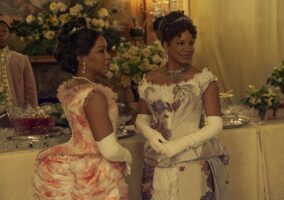 Jenna Coleman in BBC America’s “Doctor Who.”
Jenna Coleman in BBC America’s “Doctor Who.”
Last week’s “Zygon Invasion” felt less like an episode and more like the first half of one, which is why we skipped recapping it until the followup episode had aired. And while we have a full and complete story now to talk about, we feel like the added information only further damaged what was a precarious setup to begin with.
But before we pick it apart, let’s start with this: regardless of whatever issues might pop up in the discussion of this story, it cannot be denied (as far as we’re concerned) that Peter Capaldi gave the very best performance he’s ever given in this role. The entire episode came down to that wonderful monologue near the end of it; the one in which Capaldi infused his Doctor with anger, sadness, the weight of two millennia of existence, and above all, kindness. A Doctor who abhors war because he loves people so much. “I’m old enough to be your Messiah” he teased Osgood. It’s one of the very best jokes the Doctor’s made in a while, but it wasn’t merely an idle jest, because the Doctor really was setting himself up here as a sort of Messianic figure, here to save the world through the power of love. It was a wonderful – and defining – take on the character. In the nu-Who era, it seems like every Doctor gets at least a handful of chances to stand up and define himself by giving a glorious speech, such as Matt Smith taunting dozens of alien races at Stonehenge or David Tennant intoning “IT. IS. DEFENDED.” on Christmas day. But it’s rare to have a modern Doctor get one of these defining moments and have it be about how full of love he is rather than about how badass he is. Here we’ve been assuming all along that Capaldi would define his tenure by portraying a cranky Doctor (since he’s got such a talent for it), but instead, to our surprise, he’s defining himself by how evolved he is; how little he lets his anger or sadness control him anymore. This Doctor is less about action and more about intelligence and empathy. It’s an amazing turn.
Capaldi was helped tremendously by a performance from his co-star Jenna Coleman that was so good we actually forgot we were watching Jenna Coleman for a minute. Shades of Tatiana Maslany in Orphan Black; an actress so familiar to the audience becomes a total stranger when given another role to play in the same story, losing herself so much in the performance that the audience actually misses the actress for a moment. In other words, Clara was mostly sidelined for this episode but it wasn’t until we went to write about it that we realized Jenna barely missed a frame of screentime. “Bonnie” seemed so much like an original character that we forgot the same actress was playing her. Just as Capaldi’s Doctor is a man who’s grown wise and kind with the passage of time, Coleman’s “Bonnie,” was someone beaten down by war and xenophobia; someone so full of rage and hurt that she’d risk blowing up the world.
Also: she looks great all “eeeeevil,” in her black trenchcoat with her dark lips. Coleman rarely shows up onscreen without full face paint on, but it was smart to have Clara sport a clean face through most of the episode. And we should also note how female-heavy this story was. The final, tense act had the Doctor surrounded by Clara, Kate, Osgood and Bonnie. We think it’s pretty clear that Steven Moffat is making a concerted effort to not only be more inclusive this season, but to make a particular point about how integral and important women are in the world of Doctor Who, not just as “companions” but as the main drivers of the story. Whether he’s the man who does it remains to be seen, but we think he’s clearly saying that this world is ready for a female Doctor. He’s laying the groundwork for it.
But it’s a good thing we got such tremendous performances out of the leads in this tale, because the writing simply doesn’t hold up all that well under scrutiny. In fact, it tends to work against some of what’s being said outright. Very little time was spent on the TARDIS (which will forever more have to contend with “Totally And Radically Driving In Space” being a better acronym for it) or in any sort of fantastical scenarios. These two episodes had more of a political thriller feel to them as the mains all navigated modern Britain and dealt with law officers, blown up airplanes, subterfuge, commandeered cars and hidden communications to move the characters along. This made a certain amount of sense, given that there were some rather clear comparisons being made to modern real-world concerns like the European immigrant crisis or the rise of ISIS. The story raises the issue of anti-Muslim hysteria, terrorism and the immigrant crisis and then proposes a magic puzzlebox solution to all of these problems that involves mind-wiping and game-playing on a global scale. The show makes clear comparisons to real world problems and then proposes a totally fantastical and utterly ridiculous solution to dealing with them. Even worse, it implies that this scenario keeps failing and requiring the Doctor’s intervention (and subsequent mind-wiping) to prevent the death of millions. In other words, it proposes a totally fantastical solution to a real-world problem and then reveals that the solution doesn’t even work all that well.
You could argue that the solution isn’t the point here – and you’d be right. The point is to allow the Doctor to make that beautifully impassioned speech about the futility of war and how it’s merely a delaying tactic for the inevitable: the moment when two parties sit down to hash out their differences in the name of peace. No, the solutions here aren’t meant to reflect the real world. Like the best of speculative fiction, they’re meant to illustrate how we’d like the world to be. We’d all love a world in which terrorists can be convinced through the power of words to stand down and embrace peace.
But the ethics of what the Doctor continues to do here (mind wipe humans and Zygons continuously when they don’t do as he thinks they should) is questionable at best and hints at the utter futility of the exercise at worst, which tends to severely damage any metaphors or wishful thinking. Besides, even if you accept that this setup works, it’s based on the idea that immigrants should be forced to give up every single defining characteristic of their identities and totally assimilate into the dominant culture in such a way as to become invisible. THAT’S the solution being offered here, under the pretty speeches. And to be honest, if you’re going to use immigrants as a backdrop to make your speech about the futility of war and the beauty of peace, you might want to try and avoid making them all out to be secret terrorists hell bent on the destruction of anyone different from them. It tends to sully your point considerably.
It wasn’t a terrible episode by any means. In fact, it was a very thoughtful, interesting hour that gave us much to ponder and gave Capaldi a chance to really shine. It just doesn’t hold up to much scrutiny, which is a fatal shame, because it’s a story that clearly wanted to say something important.
For more discussion on your favorite shows and movies, visit our TV & Film forum.
Doctor Who: The Woman Who Lived Next Post:
Doctor Who: Face the Raven (SPOILERS)
Please review our Community Guidelines before posting a comment. Thank you!



